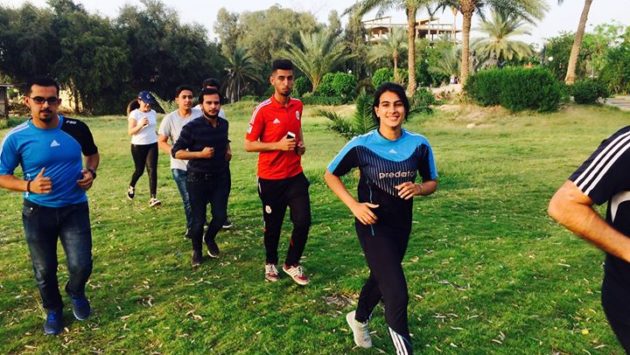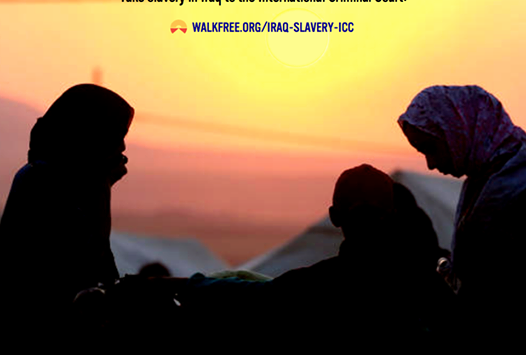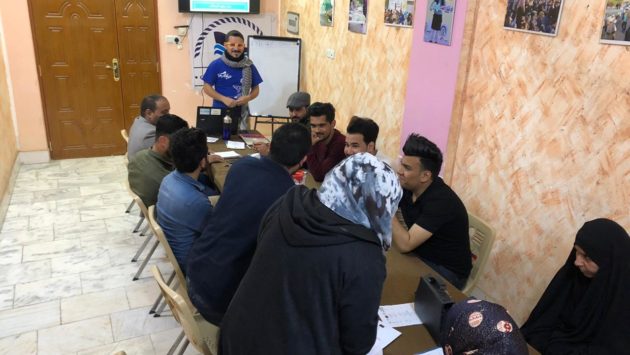A Wave of Violence Against Women in Iraq
Baghdad – NAS
Manar Ezz Al-Din
Once again, the Domestic Violence Law has returned to forefront of public debate following a horrifying incident involving a young woman, Malak, from Najaf Governorate. Violence against women has escalated due to the quarantine imposed in response to the Coronavirus pandemic, and human rights groups are calling for the law to be enacted and enforced as soon as possible in order to reduce the occurrence of similar cases.
Al-Najaf governorate recently witnessed a traumatic incident: a young girl born in 2000 was burned at her husband’s house. Accusations are circulating against the husband who is a military officer. Sources close to the family say that he had been preventing his wife from visiting her family for 8 months.
This incident was preceded several days earlier by a terrible rape of a woman in the province of Kirkuk.
Is the Iraqi legislature blind to reality?
For various reasons, the Iraqi legislature has been unable to produce a law that protects women and children in Iraq. Despite many incidents in which women and children have been harmed for killed. Dozens of women have been murdered and yet these crimes have gone unpunished as they are too easily classified under misleading names and justifications, including honor killings and ‘sudden death’. The result is that the killer is able to escape punishment.
In previous parliamentary sessions, the efforts of the civil and popular forces and the voices of some deputies (whose number has not exceeded five over the past few years), have not been able to pass the “Protection from Domestic Violence” law due to the intransigence of some religious parties which consider the proposed law inconsistent with the principles of the Islamic religion.
Women’s rights activist, Saba Odeh, says that domestic violence law has been on the shelves of the Iraqi Parliament for ten years. Odeh explained to NAS (14 April 14 2020) that “despite work to draft legislation that would protect the vulnerable from domestic violence since 2010, the law still faces many obstacles because certain parliamentary committees find fault with a number of paragraphs in the proposed law.” Odeh went on, requesting that “the competent authorities in the House of Representatives, such as the Human Rights Committee, the Legal Committee and the Women and Childhood Committee, work hard to expedite the approval of the law against domestic violence given the recent increase in cases of violence in Iraq. In the absence of a law perpetrators of these crimes cannot be held accountable.
Dr. Nada Al-Abedi said in a television interview that “there is a psychological complex amongst many Iraqi men which contributes to an increase in cases like this, especially prominent given that our Iraqi society has gone through so many difficult transitions: wars, economic decline and other threats to livelihood. This has caused men to suffer and act out, often violently against their wives and children.”
She added that “social media has reinforced suspicion and mistrust of women: because the world is more open, we hear many stories of marital infidelity, and this in turn reduces confidence and trust between men and women. Men are often plagued by doubts and these traps him live in a cycle of uncertainty and distrust.”
She noted further that “the Domestic Violence Law was politicized due to partisan conflicts, and if it existed, it would have deterred thosewho are mentally ill from harming their families.”
A security source told NAS that “a girl born in 2000 committed suicide by hanging herself with her veil attached to the ceiling fan inside her house in Hay Al-Amel district, west of Baghdad.” The source added that “the girl climbed up on a chair, tied the veil in a ceiling fan, and then wrapped it around her neck, to hang from it, before her relatives found her dead.”
Government indicators are insufficient
Journalist Manar Abdel Amir confirmed in an interview with NAS that “cases of violence against women have increased recently, especially family violence, in which women and children suffer most.”
Abdul Amir added that “it is not possible to rely on government indicators registered with police stations or family protection directorates given that these figures include only those that are formally reported, and there are many other cases that have not been reported,” noting further that there are “women who lost their lives due to family violence.” Without anyone knowing their stories, their deaths were simply listed under the “cause unknown” or “natural death.”
A journalist interested in women’s issues speaking of the story of Malak in Najaf, said that “Malak’s case is one that we are lucky to have reported in the media, but there are hundreds of similar cases, which, under various pretexts, do not appear in the news at all.”
The Women and Parliamentary Committee called on the three authorities to expedite the approval of the Law on Combating Domestic Violence to protect women and prevent violence against them.
In a statement to NAS received 13 April 2020, the Women, Family and Childhood Parliamentary Committee stated that “as a representative for women, as a part of our supervisory, legal and professional duty, we call upon the three presidencies, the government, and international and women’s organizations to adopt a broad national campaign to prevent domestic violence against women, who make up half of society and who bear great responsibilities and pressures in the various affairs of life and family.”
The committee warned that “the measures taken by the Crisis Cell to impose a curfew cast a shadow on women as a way to protect families from the risk of contracting the virus. But this attempt to limit the spread of disease makes women vulnerable, whether it be a wife, mother, sister or girl.”
The Committee renewed the “call of the three presidencies to provide legal and governmental support to women through the preparation of projects that would support and protect them in their families and also to protect them economically, socially and politically.”
The Committee also emphasized “its commitment to protect women, standing with them so that they are able to achieve their aspirations while being protected from harm. Women’s needs acknowledged and their rights ensured by established law enshrined in the constitution. This law should allow women to have genuine job opportunities that enable them to gain financial and economic independence and provide them with what is necessary to live a decent life with confidence, dignity, pride and prosperity.”
What is the Domestic Violence law?
Last September, President of the Republic Barham Salih announced that a draft of the “Domestic Violence” bill had been prepared and sent to the House of Representatives for a vote.
He said at the time that “the aim of the bill is to protect the family from violence against one of its members … especially women, girls and children, in a way that guarantees no harm will be suffered by anyone in the family, as this conflicts with our social values and religious and Quranic principles that urge respect for women’s rights.”
He explained that “the draft law making domestic violence a crime would be a law ensuring that perpetrators of violence in the home would be held accountable. It is therefore a repeal of all previous legislation that permits the practice of violence, such as the right to strike others.” He pointed out that there should also be “a formation of a high committee to combat violence …in order to prevent all forms of domestic violence.”
Article 41-1 of the amended Iraqi Penal Code of 1969 states that “there is no crime if the act is understood to be a right established by law, and this includes the right to discipline.” This may refer to a husband and his wife, or parents and teachers and children, as defined within the limits of what is prescribed by Sharia law or custom.
Saleh indicated that “the draft law provided for the formation of the Family Protection Directorate to search and investigate complaints of domestic violence and the formation of a specialized family court to investigate cases of family violence.” She went on to note that “the draft law gave a competent judge the right to issue a protection decision for the victim to be distributed to security centers in case the victim felt afraid for her life and safety. The draft law obligated the Ministry of Labor and Social Affairs to establish safe centers for victims of family violence in all governorates of Iraq and provide support and assistance to the victim by offering treatment and psychological rehabilitation.”
Previous official estimates indicate that one in every five women in Iraq has been subjected to physical violence in the family. During the year 2012, at least 36% of Iraqi wives reported that they had suffered psychological abuse from their husbands, 23% of them were subjected to verbal abuse, 6% to physical violence, and 9% to sexual violence.
The completion of the draft law is an important step, but the battle for legislation is not expected to be easy, especially in light of the strong influence of the religious authority in Iraq and the hardening of religious parties in the face of their concern about what this legislation allows.
The first draft bearing the name of this law was put forward 8 years ago, in 2012. While it has remained pending in the House of Representatives since 2015, religious parties have repeatedly prevented it from being discussed, and human rights groups consider it imperfect as it does not provide for the sufficient protection of women.
Multiple stories claim to report what really happened to Malak
Malak Al-Zaidi (20 years) is married to Mohammed Al-Mayahi, a military officer, and his father Hamid is a commander in the Iraqi army, Her sister, Sarah, published her story on social media along with pictures and videos documenting the suffering of Malak after being burned, accusing her husband of being responsible for the incident. For 8 months prior, he had been preventing Malak from visiting her family, and preventing her family and friends from visiting her. Sarah has insisted that she has evidence, actual emails “proving that the victim was subjected to violence by her husband and his family.”
But Malak’s husband, Muhammad, told another story; he said that it was his wife who burned herself, and that he tried to help her and transfer her to the hospital. He gave no reasons that might prompt her to inflict such a horrible act of violence on herself. The same story was told by his mother, who appeared on a video saying that, “She was shocked by the accident, and she did not know why Malak did it.” Muhammad also claimed that “the cooking device exploded on his wife, which led to her burning.” Muhammad and his family have offered many stories to explain how Malak was so brutally burned, all of them contradictory.
Malak’s family refuses to accept this tangled web as representative of what happened to her daughter. In an interview with Al Sharqiya TV channel Malak’s mother said “my daughter was wronged and hurt in the house of a law-abiding man.” She noted that “the narratives that tell of my daughter committing suicide, or dying from an explosion in the kitchen, miss the essential fact that she was a child and the pressure on her was severe. Her husband’s father, mother and siblings were all aware of the unbearable pressure being applied to my daughter. ”




